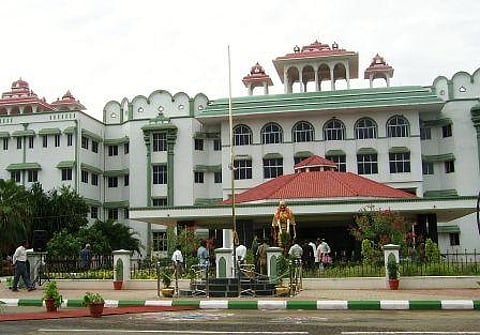

The Madurai Bench of the Madras High Court, on Tuesday, January 30, directed the Hindu Religious and Charitable Endowments (HR&CE) department and the Tamil Nadu government not to allow “non-Hindus who do not believe in Hindu religion” inside all the Hindu temples in the state. The court also ordered the authorities to install boards indicating the same in and around the temples. Justice S Srimathy, while passing the orders, also observed that temples are not ‘picnic or tourist spots’, and that Hindus have the right to maintain their temples as per their customs and practices.
The court passed the order while hearing a petition filed by D Senthil Kumar, who runs a shop in Palani and is an organiser of Palani hill temple devotee organisation. He sought installation of display boards showing that non-Hindus are not allowed in the Palani temple.
The Palani hill temple is considered to be the abode of Lord Murugan and is mentioned in Thirumurugatruppadai (Sangam Literature) as the third abode of Murugan’s ‘Arupadai Veedu’ (six houses). The main idol of the Hindu god is said to be made of ‘Navapashanam’ (nine poisonous materials), which is considered to be medicinal. Devotees are allowed to reach the hill temple by means of Winch Service, Rope Car Service and footsteps. This is the only temple in the state that has winch service. Several non-Hindus are also said to visit the temple.
Though the petition was filed seeking directions only for the Palani temple,, Justice Srimathy issued these directions to be followed in all Hindu temples by the HR&CE department and the Tamil Nadu government stating that it was a ‘larger issue’:
> Install boards stating “non-Hindus are not allowed inside temple after Kodimaram” at the entrance of the temples, near Kodimaram and at prominent places in the temple.
> Direction issued not to allow the Non-Hindus who do not believe in Hindu religion.
> If any non-Hindu claims to visit a particular deity in the temple, then the respondents shall obtain undertaking from them that they faith in the deity and would follow the customs and practices of Hindu religion and also abide by the temple customs, following which they might be allowed to visit the temple. This undertaking will be recorded in a register at the temple.
> Maintain the temple premises by strictly following the agamas, customs and practices of the temple.
The judge, while passing the orders, also pulled up the HR&CE department for having “misplaced sympathy and misplaced worry” on sentiments of non-Hindus. The government and the department argued that if such boards are installed, it would hurt the religious sentiments of people who would like to visit the temple. The court, however, observed that there is no question of hurting the sentiments of a non-believing non-Hindu who declines to follow the customs and practices of the Hindu religion and the temple.
“On the other hand if the non-Hindu who declines to follow the customs and practices of the Hindu religion and decline to follow the Temple customs is allowed inside the temple, it would affect the sentiments of the large number of Hindus who practises the faith as Hindu reverently. This would affect the right of Hindus guaranteed under the Constitution of India. The respondents are worried about the sentiments of non-Hindu who is not having faith in Hindu religion. By pleading so the respondents are failing to protect the sentiments of the Hindus. In fact, the Hindu Religion & Charitable Endowment department is mandated to protect the Hindu religion, Hindu temples, its customs and practices, temple customs etc. The respondents are having misplaced sympathy and misplaced worry on sentiments of Non-Hindus,” Justice Srimathy said.